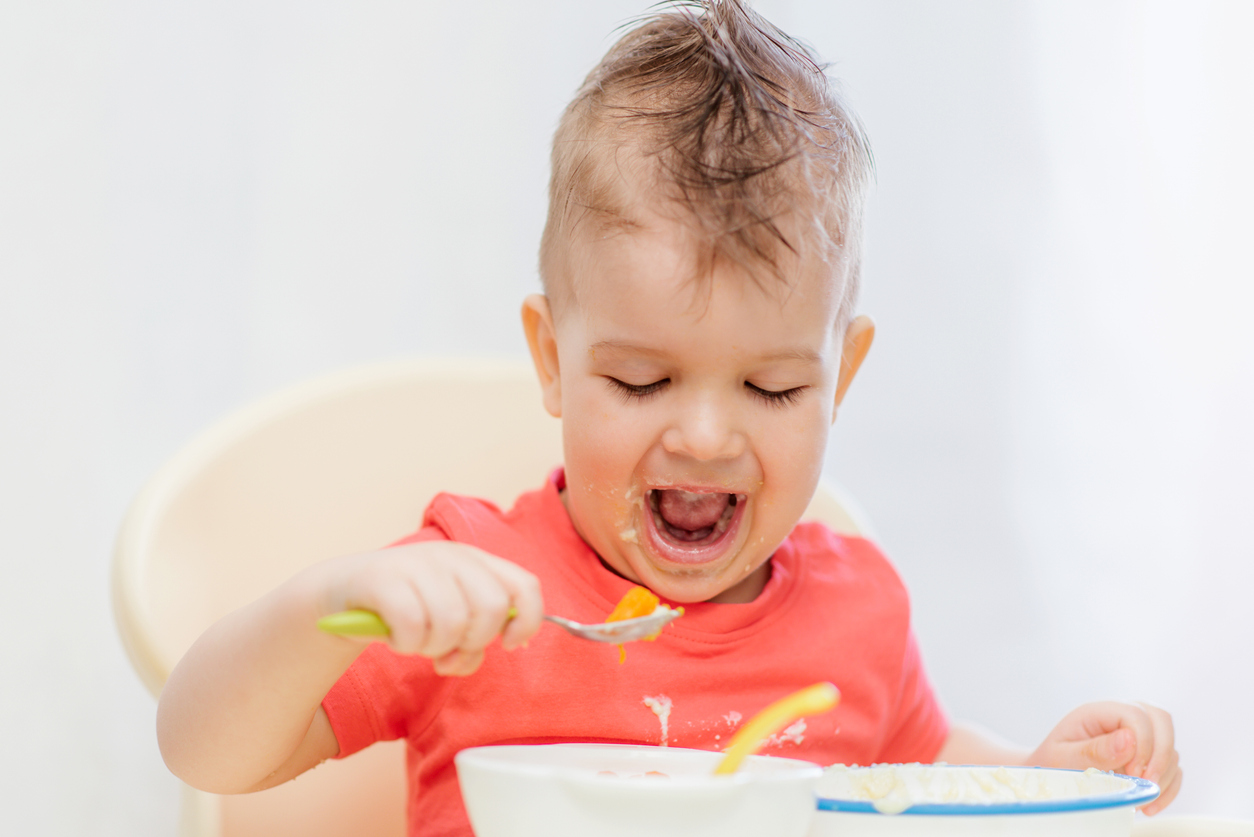Toddlers are learning, exploring, and growing fast! Between 1–3 years, children develop independence, express preferences, and learn through play – including at mealtimes.
As babies grow into toddlers, parents can expect to notice the following:
- Appetite changes from day to day, and they may even seem less hungry than when they were a baby.
- Fussy eating behaviour is common as they become more aware of their food and surroundings, forming individual preferences and opinions.
- Food and eating becomes more social as they participate in family meal times.
Key Nutrients
Iron – essential for brain development and immune function. Best food sources are red meats, leafy green vegetables, beans and legumes, fortified cereals.
Calcium – needed for growing strong bones and teeth, as well as for healthy nerve function. Best food sources are milk, cheese, yoghurt, fortified plant-based dairy alternatives, leafy green vegetables, tinned fish with edible bones (e.g tinned salmon).
Vitamin D – helps the body use calcium, from the diet, to make strong bones. It also supports immune function and mental health. Best source is sunshine. For children aged 1-3yrs exposure of the face and forearms for 15-30mins to the sun 2-3times a week is sufficient for fair skin, with slightly more time required for darker skin or in winter. Food sources of Vitamin D include eggs, oily fish and margarine.
Balancing Meals and Snacks
Nutritional needs can usually be met by offering a varied, balanced diet. Offer 3 main meals and 2-3 snacks each day using snacks as “mini meals”.
For each meal and snack, try to offer a varied combination of:
- Protein foods such as meat, egg, legumes, full cream milk,cheese or yogurt
- Fruit or vegetable
- Grain foods such as wholegrain bread, pasta or rice
- Healthy fats like olive oil, avocado or peanut butter.
This might look like:
Breakfast: 1 piece of toast with ½ cup baked beans
Morning tea: 1 English muffin with 1tbsp smashed avocado and half a cup of milk
Lunch: ½ cup pasta with 2 tbsp of beef bolognaise and 1 small corn on the cob
Afternoon tea: 2 rice cakes spread with hummus and ½ cup cherry tomatoes (halved)
Dinner: small baked potato with 50g tuna and 1 slice of cheese
Supper: ¼ cup yogurt with ½ cup of tinned pear (canned in juice)
Drinks
Water is the best drink for toddlers. Offer at meals and across the day.
Milk is a nourishing drink but limit to no more than 500mL per day. Choose full-fat cow’s milk, or a plant-based dairy-free milk fortified with at least 100mg calcium per 100mL.
Choking Safety
Toddlers teeth are still forming and they are still learning to chew foods. Ensure foods offered are an appropriate consistency to match your child’s skills and capacity.
- Always supervise your child when eating.
- Avoid hard, small, rounded foods like whole nuts, grapes and cherry tomoatoes.
- Modify risky foods (e.g. cut grapes, cook carrots, slice sausages).
Milk and Formula
- Breastfeeding can continue as long as you and your child wish.
- After 12 months, most children can drink cow’s milk or fortified plant milk without any need for toddler formulas.
- Toddler milks are expensive and often high in sugar. For most children, a variety of nourishing food and regular milk will meet all their needs.
Fussy Eating Tips
- Keep offering! It may take 10–15 tries for a new food to be accepted.
- Stay calm – pressure makes it harder for children to try new foods.
- Offer “tiny tastes” and serve new foods with familiar favourites.
- Encourage exploring food – touching, smelling, or licking counts as progress!
When to get extra support
Talk to your GP or child health nurse if your toddler:
- eats very few foods or avoids whole food groups
- has ongoing feeding battles or anxiety around food
- shows poor growth or frequent illness
- needs a restricted diet or special formula
- you’re worried or mealtimes feel stressful.
They can refer you to an Accredited Practising Dietitian for personalised advice.
Find a dietitian: www.dietitiansaustralia.org.au
